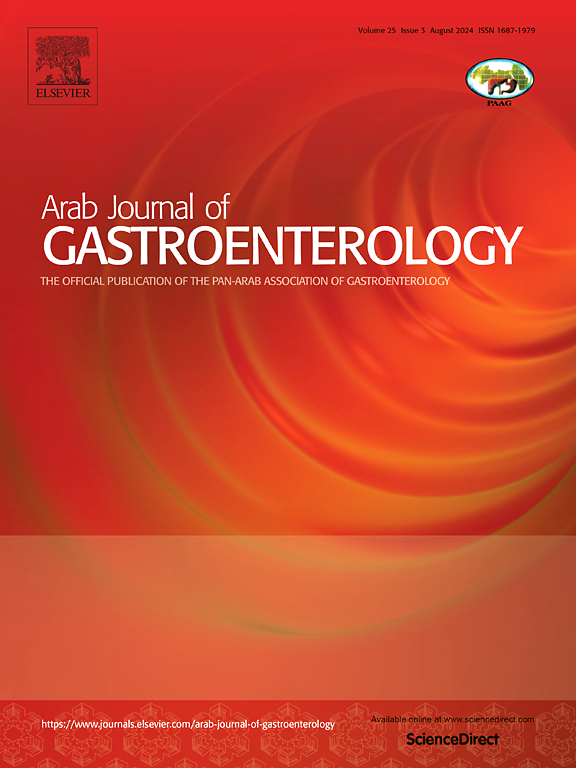Washed microbiota transplantation combined with biological agents promotes histological remission in refractory severe ulcerative colitis with recurrent intestinal infection: A case report
IF 1.1
4区 医学
Q4 GASTROENTEROLOGY & HEPATOLOGY
引用次数: 0
Abstract
Ulcerative colitis (UC) is a chronic non-specific colitis disease. In recent years, fecal microbiota transplantation (FMT), including improved washed microbiota transplantation (WMT), and biological agents have helped improve the prognosis of patients with UC. However, a significant number of patients with moderate to severe UC do not get relief from glucocorticoids, immunosuppressants, and TNF-α antagonists. Patients with severe UC are frequently burdened with opportunistic infections and subsequent surgical interventions. Combined treatment modalities are crucial for patients with severe UC and opportunistic infections. Herein, we reported a case of a 25-year-old female with refractory severe UC complicated with recurrent Clostridioides difficile infection and recurrent cytomegalovirus infection for six years. Surgical removal of the affected bowel segment was almost unavoidable. She showed endoscopic and histological recovery after comprehensive WMT and Vedolizumab treatment. The following are our learnings from the case: 1. A combination of WMT and biological agents can potentially obviate the necessity for surgical treatment in patients with refractory severe UC and promote histological remission. 2. Personalized comprehensive treatment and chronic disease management models for patients with UC should be emphasized. 3. WMT can help treat opportunistic infections, which may also strengthen the treatment with gut-targeted biological agents when traditional TNF-α antagonists show poor efficacy.
洗涤微生物群移植联合生物制剂可促进伴有反复肠道感染的难治性重度溃疡性结肠炎的组织学缓解:病例报告。
溃疡性结肠炎(UC)是一种慢性非特异性结肠炎疾病。近年来,粪便微生物群移植(FMT)(包括改良的洗净微生物群移植(WMT))和生物制剂有助于改善 UC 患者的预后。然而,相当多的中重度 UC 患者无法从糖皮质激素、免疫抑制剂和 TNF-α 拮抗剂中获得缓解。重度 UC 患者经常会受到机会性感染和后续手术治疗的困扰。对于重症 UC 和机会性感染患者来说,综合治疗方法至关重要。在此,我们报告了一例 25 岁女性重症 UC 患者,她患有难治性重症 UC 并发复发性艰难梭菌感染和巨细胞病毒感染长达 6 年之久。手术切除受影响的肠段几乎是不可避免的。经过全面的 WMT 和 Vedolizumab 治疗后,她的内镜和组织学表现均已恢复。以下是我们从该病例中学到的经验:1.对于难治性重度 UC 患者,WMT 和生物制剂的联合治疗有可能避免手术治疗的必要性,并促进组织学缓解。2.应重视 UC 患者的个性化综合治疗和慢性疾病管理模式。3.WMT有助于治疗机会性感染,当传统的TNF-α拮抗剂疗效不佳时,WMT还可加强肠道靶向生物制剂的治疗。
本文章由计算机程序翻译,如有差异,请以英文原文为准。
求助全文
约1分钟内获得全文
求助全文
来源期刊

Arab Journal of Gastroenterology
Medicine-Gastroenterology
CiteScore
2.70
自引率
0.00%
发文量
52
期刊介绍:
Arab Journal of Gastroenterology (AJG) publishes different studies related to the digestive system. It aims to be the foremost scientific peer reviewed journal encompassing diverse studies related to the digestive system and its disorders, and serving the Pan-Arab and wider community working on gastrointestinal disorders.
 求助内容:
求助内容: 应助结果提醒方式:
应助结果提醒方式:


